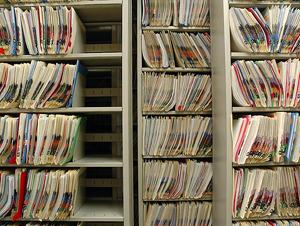Making medical records accessible
(image: benben/Flickr)
Health workers in Africa face many challenges, even in times of peace. Hospitals and health centers often lack basic necessities. That includes systems for storing medical records. There is now a global effort to tackle this life-or-death issue. The goal: to provide a computerized medical record system that anyone anywhere can use.
Ask Hamish Fraser about medical record-keeping in places like Kenya, Peru, and Haiti, and he says, "The reality is that you probably wouldn't see any good record-keeping. People are so busy, the resources are very short, so there isn't really a strong tradition of record-keeping."
Fraser is a cardiologist, and he works for a group called Partners in Health. Fraser says that in countries beset with problems, such as AIDS, good patient records are vital.
"Especially with HIV, you are dealing with a chronic disease. These patients, once they start treatment, need to remain on it for the rest of their lives, of course. The importance of record-keeping jumps enormously, and it becomes very difficult to do a good job managing these patients unless you know what is happening with them."
In the developing world, the options for computerized medical records are limited. Off-the-shelf systems are expensive and not always customizable.
Partners in Health found a more comprehensive solution a few years ago. It is called Open Medical Records System, or Open M.R.S. It was developed by the Regenstrief Institute, a research organization based at the Indiana University School of Medicine. Open M.R.S. was created with the developing world in mind. The software is free, anyone can download it. Since it is open-source, changes to the system are allowed if those changes are shared in turn.
Efforts to improve Open M.R.S. continue across the globe. Those involved with the project say that more and more of the modifications and fixes are being made by locals. And, on the Open M.R.S. website, you are likely to see programmers from Kenya, Rwanda, and Pakistan trading tips and sharing code.
The story you just read is accessible and free to all because thousands of listeners and readers contribute to our nonprofit newsroom. We go deep to bring you the human-centered international reporting that you know you can trust. To do this work and to do it well, we rely on the support of our listeners. If you appreciated our coverage this year, if there was a story that made you pause or a song that moved you, would you consider making a gift to sustain our work through 2024 and beyond?
